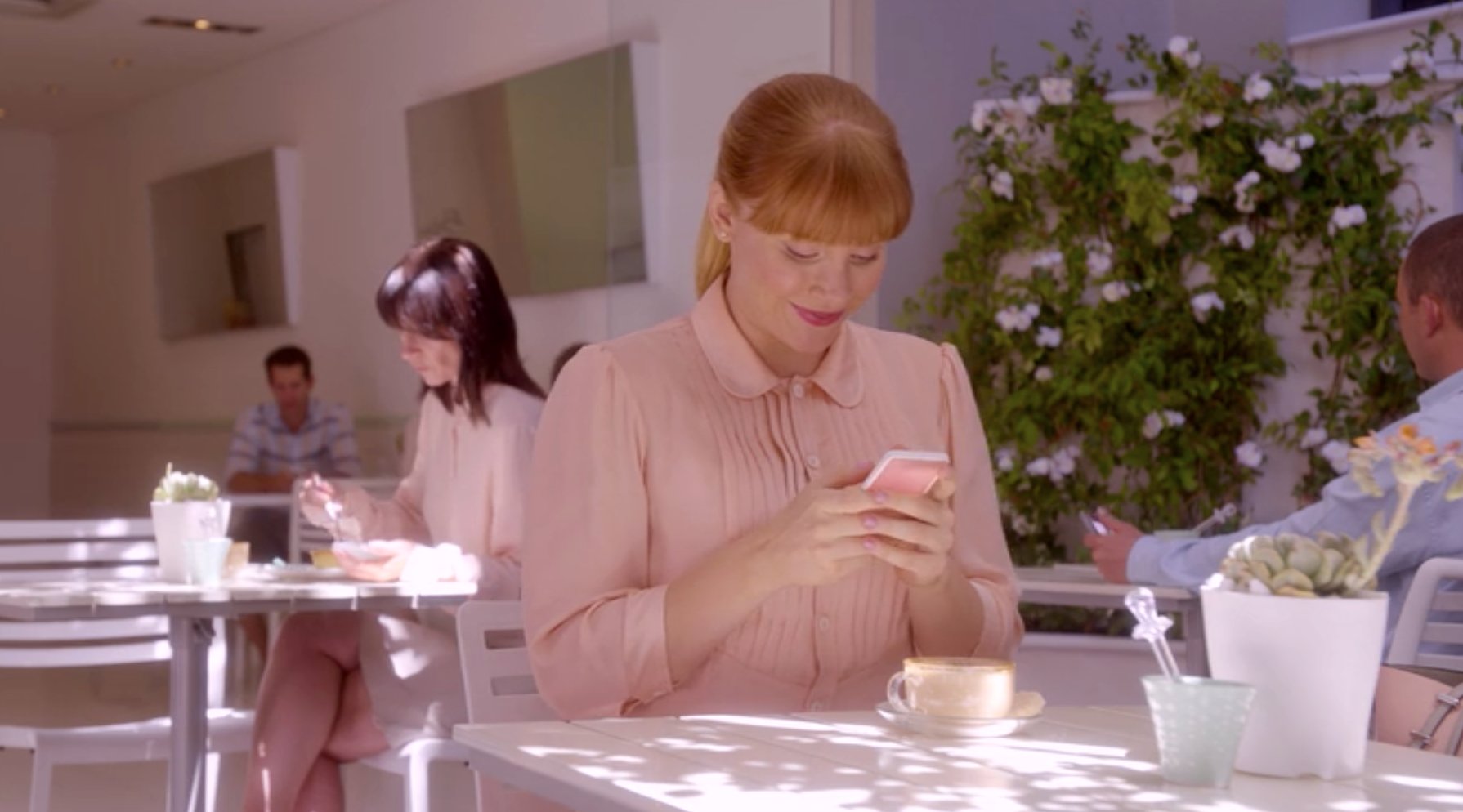Social media, as ubiquitous as it may feel, remains a rather recent aspect of our daily life—and an even more recent feature of our television shows and movies. In the 1990s, select movies like The Net and You’ve Got Mail briefly touched on social media’s revolution of our daily lives; the 2000s, with films like The Social Network and Me and You and Everyone We Know, offered more probing meditations on these new technologies. Today, more storytellers are using social media as a plot device, but with an often similar tone: Many are painting a grim picture, highlighting the narcissism required to (over)share one’s life with “friends” and strangers.
The most recent examples: the Black Mirror episode “Nosedive” and the films The Circle and Ingrid Goes West, all released within the last year. The latter film, released today, centers on an eponymous protagonist (played by Aubrey Plaza) who carefully curates her digital footprint—in one scene, she seriously considers the difference between punctuating an online comment with “Hahahaha,” “Heheheh,” or just “Heh Heh”—and (literally) stalks influencers. “Nosedive” follows Lacey (Bryce Dallas Howard), who lives in a near-future where one’s social media status dictates one’s socioeconomic standing; after her ranking takes a tumble, she melts down in front of an appalled bride and her guests at a friend’s wedding. In James Ponsoldt’s film The Circle (an adaptation of Dave Eggers’ novel of the same name), Mae (Emma Watson), a new employee at the eponymous tech hub The Circle, becomes the company’s poster girl for encouraging consumers to share more about their lives, and, subsequently, forsake their private information.
These narratives are all spirited takedowns of our selfie-taking culture—and all star young women as self-made victims of its more insidious elements. That’s interesting given that some research has shown men care even more about social media likes as women. But it’s not particular surprising: Women have long been depicted as victims of tech’s dark side in popular culture.
In her book about electronic communication in the 19th century, When Old Technologies Were New, communications professor Carolyn Marvin writes that early electrical journals reporting on new telephonic inventions painted women as ignorant of these advances and prone to mishandling them. “Talkative women and their frivolous electrical conversations about inconsequential personal subjects were contrasted with the efficient, task-oriented, worldly talk of business and professional men,” Marvin writes.
Later, writers channeled fears about communication technology’s industrial and cultural effects through writing that suggested it threatened women’s safety. As Marvin writes, “Women were considered especially susceptible to male manipulators of electrical technology because of their less-worldly experience in gauging trustworthiness.” Early-2000s attempts at representing and reversing narratives about helpless women falling prey to strangers on instant-messaging platforms, like the film Hard Candy and memoirs like katie.com, suggested that such 19th-century anxieties were very much alive.

(Photo: Neon)
Ingrid, Lacey, and Mae offer a more updated vision of how old gender-based assumptions sneak into stories about women and technology. Ingrid, for example, moves to Los Angeles at the beginning of Ingrid Goes West to mimic the Instagram-perfect lifestyle of beautiful social media influencer Taylor Sloane (Elizabeth Olsen). Initially stalking Taylor and purchasing the many clothes, purses, and other products the influencer posts about on her profile, Ingrid soon becomes her friend—but only in the surface-level meaning of the word that Facebook has pioneered. Later in the movie, Ingrid takes a creepy picture of the two of them while Taylor is asleep at her side, in a sinister twist on the Facebook-photo-as-mediated-proof-of-friendship genre.
In Black Mirror‘s “Nosedive” episode, Lacey doesn’t just slave over a plate of perfect-looking paté to share a perfect picture, all in the hopes of increasing her social media “score”—she also gives high scores to service workers to receive high scores back and wears pastel colors, all to project a positive image that will maintain her high-class status. When her rating decreases, she cannot take a flight, or buy the home of her dreams. The episode’s emphasis on appearances, which have quantitative value in her future society, make Lacey double down on the kinds of vain and superficial behaviors that are so often tied to women’s emotional labor.
In The Circle, Mae, at first indifferent about sharing pictures of her private life, later spearheads The Circle’s fight against privacy after encouragement from her colleagues and supervisors. She broadcasts her life and proselytizes for the company, equating keeping experiences to one’s self with stealing—”sharing is caring,” becomes her motto. Mae’s nurturing catchphrase—actually insidious corporate lingo—is a scary rebranding of social media use; it’s also a rebranding of a cliché often used by mothers and primary-education teachers (who are predominately women).
Meanwhile, male characters in these titles are oblivious, indifferent, or altogether hostile to the shared and shareable existence. While Lacey is very proud of her current social standing (she’s earned a 4.2 social media score), her brother is all too happy with being, as she colorfully puts it, a “three-point fuck” who’s content staying at home playing video games. Where Lacey is prissy and precious about her social rating, her laid-back and carefree brother ultimately amplifies the episode’s message that the work required to develop caché on social media also impedes individual freedoms.

(Photo: Channel 4)
Similarly, in both Ingrid Goes West and The Circle, it’s men who are the voices of reason and counterpoints to social media-obsessed, female characters. While Ingrid Goes West‘s Taylor posts about daily inanities like avocado toast, her adorable dog Rothko, and her place in Joshua Tree, her wannabe-artist husband rebukes any attempt at commodifying his privacy. “I just prefer to keep certain parts of my life private. Let my work speak for itself,” he says. He may sound like a Luddite to Taylor’s friends, but his fears end up being warranted once he sees firsthand how Ingrid’s access to his wife’s Instagram—and the personal information she posts on it—ends up derailing their lives. The Circle‘s most ardent anti-tech character, Mae’s ex-boyfriend Mercer (Ellar Coltrane) mocks the way the company encourages its users to send “smiles” and “frowns” to one another to react to each other’s statuses (“that used to be for middle school!” he says); his skepticism will eventually get him killed.
This gender divide is common in conversations around social media usage. While plenty of ink has been spilled examining why there are more women than men on Instagram, men aren’t inured from the allure of social media. The fact that platforms like LinkedIn and Facebook boast more male users suggests that such behavior may just be happening elsewhere. In fact, a recent Kaspersky Lab study found that “around one-in-ten people (12 percent) pretend to be somewhere or doing something that might not be strictly true” in order to garner more attention and likes on social media. This practice, the researchers found, was more acute among men, who were slightly more sensitive to the attention they seek. “Men also get upset if they do not get the likes they hope for,” the study’s authors found. “[Twenty-four] percent worry that if few people like their posts, their friends will think they are unpopular, compared to 17 percent of women.”
Overall, “Nosedive” is perhaps the most keen-eyed critique of the demographics of social media usage of recent titles: It conveys one’s broadcasted life (via check-ins, photos, and status updates) as a socially sanctioned status that applies to all genders, even as the episode focuses on a woman’s self-destructive obsession. To live outside such a system—like Mercer tries to do in The Circle, to catastrophic results—is conceived as a near-impossible, if not outright laughable, choice.

(Photo: STX Entertainment)
To be sure, a small number of films have focused on men’s attraction to social media. Many of these titles—The Social Network, Her, and several of the storylines in Jason Reitman’s sprawling Men, Women, & Children—depict men as melancholy loners who attempt to find connection through social media. The Social Network ends on its main character refreshing his Facebook to see whether his ex-girlfriend accepted his friend request; Her shows a wholesome man who earnestly falls in love with his phone’s A.I.; Reitman’s ensemble film ends with its male narrator quoting Carl Sagan (“Like it or not, for the moment, the Earth is where we make our stand”) to neatly conclude the film’s musings on our interconnectedness in the digital age. None are in danger; they’re all just a little sad.
It’s hard not to see women getting the shorter end of the stick, still, in today’s female-centered titles. After all, once one goes to both ends of the sexual spectrum of men on social media, with “Alpha” straight males wearing their real-life anxieties on their digital sleeves via CrossFit posts and 4chan threads on one side, and gay men building picture-perfect images of an unattainable ab-ripped beauty standard on the other, it becomes clear that men are just as susceptible to the narcissistic pull of the selfie, the rambling status, and digital “friends.” A quick scroll through Instagram or Facebook produces a needling sense that Hollywood isn’t so much representing a world where women are more likely to be ensnared by the pull of social media as actively ingraining such a notion as a cultural truth.





